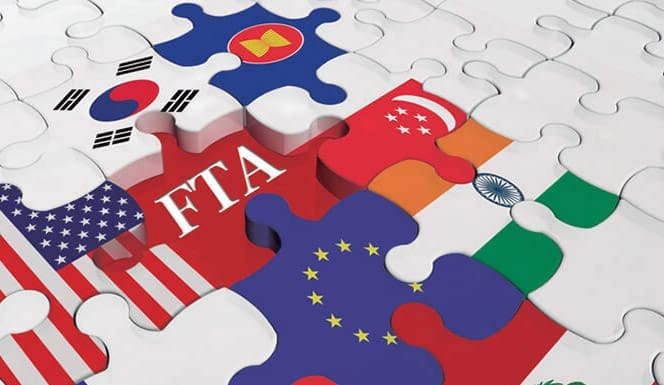In a significant policy shift, India has reportedly put negotiations on several Free Trade Agreements (FTAs) on hold. The government is currently working on a comprehensive Standard Operating Procedure (SoP) to guide future FTA negotiations. This move comes amid growing concerns over the impact of existing FTAs, particularly the one with the United Arab Emirates (UAE).
Since the UAE-India FTA came into effect in May 2022, India has observed a surge in imports of certain products, including silver products, platinum alloy, and dry dates. The Indian government has raised concerns with the UAE regarding the potential circumvention of rules of origin.
This development has prompted a broader reassessment of India’s FTA strategy. While the country has inked deals with the UAE, Australia, and the EFTA nations, and is in advanced talks with Oman and the UK, the recent experiences have highlighted the need for a more cautious and strategic approach.
Key Concerns and Considerations:
- Unexpected Import Surges: The sharp rise in imports from the UAE has raised questions about the effectiveness of safeguards and the potential for unintended consequences.
- Government Procurement: India’s decision to open up government procurement in the Japan deal has set a precedent that may impact future negotiations.
- Non-Trade Issues: The increasing prominence of non-trade issues like labour standards, environmental concerns, and human rights in trade agreements could complicate negotiations, especially with the EU.
- Intellectual Property Rights (IPRs): India’s concessions on IPRs in the EFTA deal may have broader implications for future negotiations.
A More Rigorous Approach:
The proposed SoP aims to establish clear guidelines and red lines for future FTA negotiations. Key priorities include:
- Protecting Domestic Industries: Safeguarding domestic industries from unfair competition, particularly in sectors sensitive to import surges.
- Balancing Trade Interests: Ensuring that FTAs benefit both India and its trading partners.
- Addressing Non-Trade Issues: Developing a comprehensive approach to non-trade issues to avoid compromising on domestic priorities.
- Periodic Review and Exit Clauses: Implementing a robust mechanism for reviewing FTAs and, if necessary, invoking exit clauses.
By adopting a more strategic approach to FTAs, India can maximise the benefits of trade liberalisation while mitigating potential risks. This includes gradually reducing Most Favoured Nation (MFN) tariffs and addressing inverted duty structures to create a level playing field for domestic industries.

